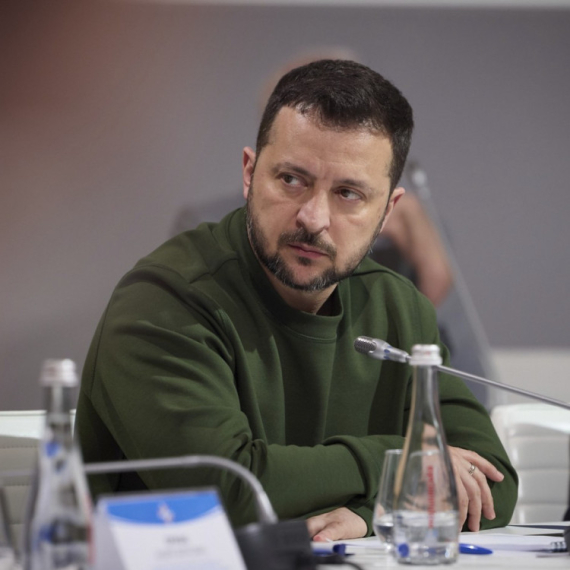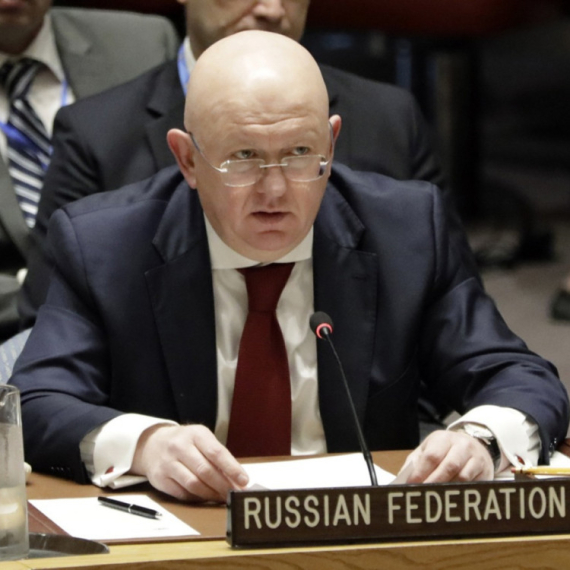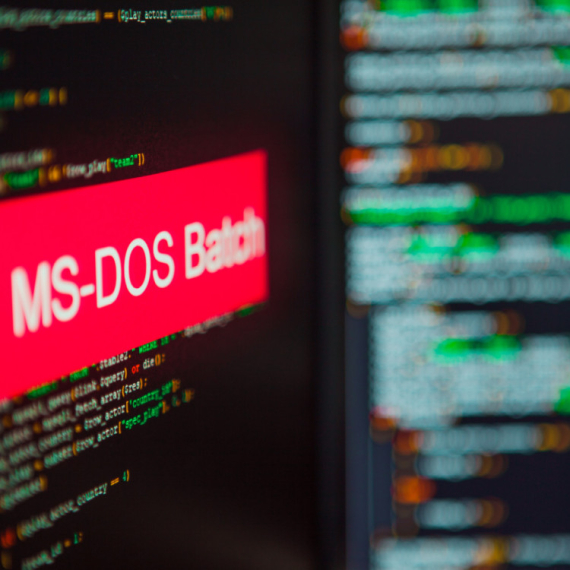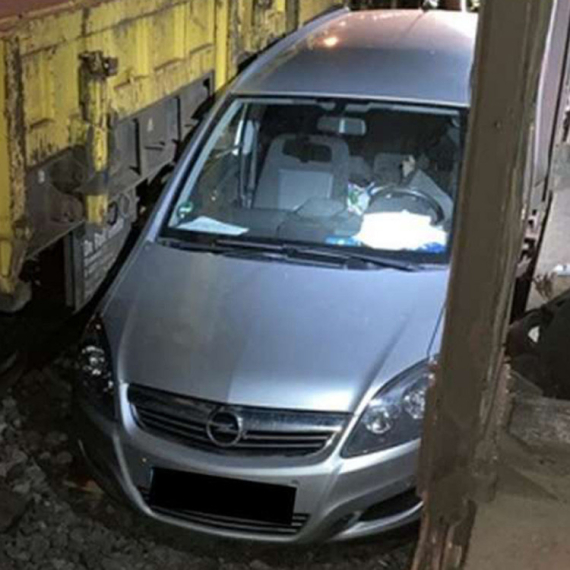FM Jeremić addresses UN SC
Wednesday, 17.06.2009.
22:14

FM Jeremic addresses UN SC Excerpts from Jeremic's address follow: The United Nations remains the overall authority in Kosovo, as mandated by this Council in Resolution 1244 (1999). It must continue to play a vital role in coordinating all the international organizations that operate under its umbrella. UNMIK's capacity to cooperate effectively with EULEX in particular, must not be constrained. Our amendments to the UNMIK budget for the next fiscal year have sought to reinforce this essential element of its mandate. At the very beginning of my remarks, I would like to express my country's deep gratitude to the substantial majority of UN member States that respect Serbia's sovereignty and territorial integrity. The solidarity we have received from all over the globe encourages us to persevere in our efforts to resolve the future status of Kosovo in a way that is acceptable to all responsible stakeholders. It is my sincere hope that we will continue to work together in defense of the basic principles of international law, thus strengthening the universal case for the consensual resolution of disputes in the world. At the same time, we note with deep regret the dismissal of Resolution 1244 (1999) by Pristina. As the Secretary-General's report makes plain, the ethnic-Albanian authorities in Kosovo assert that-here I quote – "they have no legal obligation to abide by it". No one should be permitted to ignore the decisions of the Security Council. We therefore urge the Council to insist that all parties uphold commitments that arise from Resolution 1244 (1999). It was passed under Chapter VII of the UN Charter, which binds all to respect its provisions in full. This is our common legal imperative, and our moral obligation. Serbia will never, under any circumstances, implicitly or explicitly, recognize the unilateral declaration of independence of the ethnic-Albanian authorities of our southern province. On this issue, we shall not yield - come what may. We will continue to vigorously defend our integrity in a non-confrontational manner - using all peaceful means at our disposal. As a result of our measured response to UDI (unilateral declaration of independence, or UDI, by the ethnic-Albanian authorities of Serbia's southern province of Kosovo and Metohija), the unstable equilibrium on the ground has largely been kept in check. We have sought to contain flash-points despite numerous provocations – such as targeted power cuts, pressure to sign loyalty oaths, and the construction of new, unauthorized housing settlements. Kosovo should not stand beyond the rules of the international system. It is no exception, no unique case, no sui generis. As a result of UDI, this has become a test case of global significance. Should it be allowed to stand, a door would open for challenging the territorial integrity of any UN member State. On October 8th, 2008, the General Assembly approved - by an overwhelming margin – a resolution to refer the UDI issue to the International Court of Justice. The judicial proceeding has begun. It marks the first time ever that the ICJ has been asked to consider the legality of a unilateral attempt by an ethnic minority to secede from a UN member State, in defiance of its democratic Constitution and the will of the Security Council. This case has attracted attention across the globe - as the active participation before the Court of countries from all continents in the UDI hearings make clear. The ICJ's conclusions will have far-reaching consequences for the international system as a whole. It is therefore vitally important that the legal process be allowed to run its course, free of political interference. We should all respect the fact that the Court is deliberating on the issue. Therefore, new UDI recognitions should not be encouraged. And multilateral bodies should refrain from extending membership to the secessionist authorities in Pristina. Once the ICJ hands down its opinion, we will have cause to look again into the issue, informed by the findings of the Court. In the meantime, we should find strength to put our differences on status to one side, for the sake of peace and stability, and the residents of the province. I propose that we begin with the central humanitarian issue of internally displaced persons. According to the UNHCR, more than 200,000 Kosovo Serb IDPs have not returned to the province. Last year, only around five-hundred did – during the latest reporting period, no more than thirty. This is a failure of monumental proportions. Kosovo Serb IDPs want to exercise their right of return, and we must do everything to bring them back home. That means improving conditions on the ground for them to feel safe. Few destroyed houses have been rebuilt, and most remain empty. This is not, however, where the biggest problem lies. More than 40,000 claims have been filed by Kosovo Serb IDPs for the return of illegally-seized private property. And they have not heard back. The first step, therefore, is making sure these are delivered. Right now, that's impossible. Sadly, the UNMIK-administered Kosovo Property Agency has ceased to exist. We urge the international community to embrace the SRSG's initiative with the United Nations High Commissioner for Refugees to enable the UNHCR to take over the functions previously performed by the KPA. Through its Office in Belgrade and others in Serbia, this UN agency can serve as a focal point of our engagement. On April 6th, the European Union announced that EULEX has reached full operational capacity, following the visit to Belgrade by the Head of EULEX, Mr. Yves de Kermabon. While the United Nations has not transferred all rule of law functions to the European Law and Order Mission in Kosovo, it has adhered to the assumption of EULEX's operational responsibility within the parameters set out in the Secretary-General's November 24th, 2008, report. That report affirms that "EULEX will fully respect Resolution 1244 (1999) and operate under the overall authority and within the status-neutral framework of the United Nations". Since that time, the Republic of Serbia has engaged with EULEX and UNMIK on a whole host of practical issues of common concern, within the parameters welcomed by the Security Council. The Secretary-General's Six Points Agreement must be applied in full. Some progress in that direction has been achieved, although 'comprehensive or long-term solutions have not yet been agreed' - to quote the language of the report. We deeply regret that more has not been accomplished to date. This is due in part to the reluctance of Pristina to accept that the infamous "Ahtisaari Plan" was not endorsed by the Security Council – thanks in large part to the principled position of the Russian Federation. We hope that in the months ahead, we will be able to arrive at a set of practical arrangements acceptable to responsible stakeholders. It is clear that a more active role by EULEX, consistent with its mandate, will be required-as will closer coordination with UNMIK. I would like to draw the attention of the Security Council to a critically important issue – namely, facilitating the entry of Serbian officials into the province. This question has unfortunately been accumulating ill-will for several months, and threatens to derail constructive efforts on all other fronts. It is difficult to imagine how we can positively contribute to developments on the ground, if our ability to work closely with the Kosovo Serb community throughout the province is hindered. Serbian officials must be able to visit churches and monasteries, assist in the return of IDPs to reconstructed homes, provide food and medical aid, help maintain educational standards, and engage on a whole host of other, similar activities. Operational responsibility to EULEX was welcomed on the presupposition that it would make use of its executive functions when required. Now is such a time. We demand that all necessary measures are taken to swiftly resolve this issue of paramount importance. Before coming to the end of my remarks, I would like to acknowledge the useful role played by KFOR in Kosovo. It has the responsibility to protect our enclaves and holy sites - including those placed on UNESCO's List of World Heritage in Danger - from potential threats, incursions and attacks. KFOR's status-neutral presence in the province is still required in order to satisfy the legitimate security needs of the local population, irrespective of ethnicity. We believe that under the present circumstances, a troop reduction would be counter-productive. We will continue to be a reliable partner of KFOR, in accordance with Resolution 1244 (1999) and the Kumanovo Military-Technical Agreement. The so-called Kosovo Security Force is an illegal paramilitary organization. Its existence and activities, present and future, constitute a direct danger to the consolidation of peace and stability in the Western Balkans. It must be disbanded immediately. The Security Council must continue to play a key role in the Kosovo dispute. We believe it would be beneficial for the Council to visit Serbia-Belgrade, Pristina, North Kosovo, and the enclaves-in order to see firsthand how much work still needs to be done on the ground, within the framework of Resolution 1244 (1999). The only conclusion I believe could be drawn is that coming to an agreement is the way forward. Regretfully, this has not yet been attempted. A file photo of UN SC in session (Beta/AP) Foreign Minister Vuk Jeremic on June 17 demanded from the United Nations Security Council to insist that all must abide by the obligations stemming from UNSC Resolution 1244, and urged that recognitions of the unilaterally proclaimed independence of Kosovo not be encouraged. The minister addressed the Security Council which gathered to consider the latest report on the UN mission in the province, UNMIK, submitted by UN Secretary-General Ban Ki-moon. Foreign Minister Vuk Jeremic on June 17 addressed the United Nations Security Council and urged that recognitions of the unilaterally proclaimed independence of Kosovo not be encouraged.
FM Jeremić addresses UN SC
Excerpts from Jeremić's address follow:The United Nations remains the overall authority in Kosovo, as mandated by this Council in Resolution 1244 (1999). It must continue to play a vital role in coordinating all the international organizations that operate under its umbrella. UNMIK's capacity to cooperate effectively with EULEX in particular, must not be constrained. Our amendments to the UNMIK budget for the next fiscal year have sought to reinforce this essential element of its mandate.
At the very beginning of my remarks, I would like to express my country's deep gratitude to the substantial majority of UN member States that respect Serbia's sovereignty and territorial integrity.
The solidarity we have received from all over the globe encourages us to persevere in our efforts to resolve the future status of Kosovo in a way that is acceptable to all responsible stakeholders.
It is my sincere hope that we will continue to work together in defense of the basic principles of international law, thus strengthening the universal case for the consensual resolution of disputes in the world.
At the same time, we note with deep regret the dismissal of Resolution 1244 (1999) by Priština. As the Secretary-General's report makes plain, the ethnic-Albanian authorities in Kosovo assert that-here I quote – "they have no legal obligation to abide by it".
No one should be permitted to ignore the decisions of the Security Council.
We therefore urge the Council to insist that all parties uphold commitments that arise from Resolution 1244 (1999). It was passed under Chapter VII of the UN Charter, which binds all to respect its provisions in full. This is our common legal imperative, and our moral obligation.
Serbia will never, under any circumstances, implicitly or explicitly, recognize the unilateral declaration of independence of the ethnic-Albanian authorities of our southern province.
On this issue, we shall not yield - come what may. We will continue to vigorously defend our integrity in a non-confrontational manner - using all peaceful means at our disposal.
As a result of our measured response to UDI (unilateral declaration of independence, or UDI, by the ethnic-Albanian authorities of Serbia's southern province of Kosovo and Metohija), the unstable equilibrium on the ground has largely been kept in check. We have sought to contain flash-points despite numerous provocations – such as targeted power cuts, pressure to sign loyalty oaths, and the construction of new, unauthorized housing settlements.
Kosovo should not stand beyond the rules of the international system. It is no exception, no unique case, no sui generis. As a result of UDI, this has become a test case of global significance. Should it be allowed to stand, a door would open for challenging the territorial integrity of any UN member State.
On October 8th, 2008, the General Assembly approved - by an overwhelming margin – a resolution to refer the UDI issue to the International Court of Justice.
The judicial proceeding has begun. It marks the first time ever that the ICJ has been asked to consider the legality of a unilateral attempt by an ethnic minority to secede from a UN member State, in defiance of its democratic Constitution and the will of the Security Council.
This case has attracted attention across the globe - as the active participation before the Court of countries from all continents in the UDI hearings make clear.
The ICJ's conclusions will have far-reaching consequences for the international system as a whole. It is therefore vitally important that the legal process be allowed to run its course, free of political interference.
We should all respect the fact that the Court is deliberating on the issue. Therefore, new UDI recognitions should not be encouraged. And multilateral bodies should refrain from extending membership to the secessionist authorities in Priština.
Once the ICJ hands down its opinion, we will have cause to look again into the issue, informed by the findings of the Court.
In the meantime, we should find strength to put our differences on status to one side, for the sake of peace and stability, and the residents of the province.
I propose that we begin with the central humanitarian issue of internally displaced persons. According to the UNHCR, more than 200,000 Kosovo Serb IDPs have not returned to the province. Last year, only around five-hundred did – during the latest reporting period, no more than thirty. This is a failure of monumental proportions.
Kosovo Serb IDPs want to exercise their right of return, and we must do everything to bring them back home. That means improving conditions on the ground for them to feel safe. Few destroyed houses have been rebuilt, and most remain empty. This is not, however, where the biggest problem lies. More than 40,000 claims have been filed by Kosovo Serb IDPs for the return of illegally-seized private property. And they have not heard back.
The first step, therefore, is making sure these are delivered. Right now, that's impossible. Sadly, the UNMIK-administered Kosovo Property Agency has ceased to exist.
We urge the international community to embrace the SRSG's initiative with the United Nations High Commissioner for Refugees to enable the UNHCR to take over the functions previously performed by the KPA. Through its Office in Belgrade and others in Serbia, this UN agency can serve as a focal point of our engagement.
On April 6th, the European Union announced that EULEX has reached full operational capacity, following the visit to Belgrade by the Head of EULEX, Mr. Yves de Kermabon.
While the United Nations has not transferred all rule of law functions to the European Law and Order Mission in Kosovo, it has adhered to the assumption of EULEX's operational responsibility within the parameters set out in the Secretary-General's November 24th, 2008, report. That report affirms that "EULEX will fully respect Resolution 1244 (1999) and operate under the overall authority and within the status-neutral framework of the United Nations".
Since that time, the Republic of Serbia has engaged with EULEX and UNMIK on a whole host of practical issues of common concern, within the parameters welcomed by the Security Council. The Secretary-General's Six Points Agreement must be applied in full. Some progress in that direction has been achieved, although 'comprehensive or long-term solutions have not yet been agreed' - to quote the language of the report.
We deeply regret that more has not been accomplished to date. This is due in part to the reluctance of Priština to accept that the infamous "Ahtisaari Plan" was not endorsed by the Security Council – thanks in large part to the principled position of the Russian Federation.
We hope that in the months ahead, we will be able to arrive at a set of practical arrangements acceptable to responsible stakeholders. It is clear that a more active role by EULEX, consistent with its mandate, will be required-as will closer coordination with UNMIK.
I would like to draw the attention of the Security Council to a critically important issue – namely, facilitating the entry of Serbian officials into the province. This question has unfortunately been accumulating ill-will for several months, and threatens to derail constructive efforts on all other fronts.
It is difficult to imagine how we can positively contribute to developments on the ground, if our ability to work closely with the Kosovo Serb community throughout the province is hindered.
Serbian officials must be able to visit churches and monasteries, assist in the return of IDPs to reconstructed homes, provide food and medical aid, help maintain educational standards, and engage on a whole host of other, similar activities.
Operational responsibility to EULEX was welcomed on the presupposition that it would make use of its executive functions when required. Now is such a time. We demand that all necessary measures are taken to swiftly resolve this issue of paramount importance.
Before coming to the end of my remarks, I would like to acknowledge the useful role played by KFOR in Kosovo. It has the responsibility to protect our enclaves and holy sites - including those placed on UNESCO's List of World Heritage in Danger - from potential threats, incursions and attacks.
KFOR's status-neutral presence in the province is still required in order to satisfy the legitimate security needs of the local population, irrespective of ethnicity. We believe that under the present circumstances, a troop reduction would be counter-productive.
We will continue to be a reliable partner of KFOR, in accordance with Resolution 1244 (1999) and the Kumanovo Military-Technical Agreement.
The so-called Kosovo Security Force is an illegal paramilitary organization. Its existence and activities, present and future, constitute a direct danger to the consolidation of peace and stability in the Western Balkans. It must be disbanded immediately.
The Security Council must continue to play a key role in the Kosovo dispute.
We believe it would be beneficial for the Council to visit Serbia-Belgrade, Priština, North Kosovo, and the enclaves-in order to see firsthand how much work still needs to be done on the ground, within the framework of Resolution 1244 (1999).
The only conclusion I believe could be drawn is that coming to an agreement is the way forward. Regretfully, this has not yet been attempted.











































Komentari 8
Pogledaj komentare